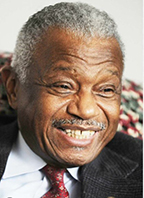By Mark Pazniokas
(Source: ctmirror)
Right now, every gift to CT Mirror is being MATCHED — doubling your support for original, in-depth journalism in Connecticut.
Thirman L. Milner, whose election as Hartford’s mayor in 1981 made him the first popularly elected Black mayor of a New England city, an accomplishment tempered by a city charter that gave him scant power over three two-year terms, died Friday. He was 91.
His death was announced by Virginia Monteiro, who was Milner’s stepdaughter and is the first vice president of the Connecticut NAACP and its Hartford branch. No other details were provided.
Milner’s victory over George A. Athanson resonated in a city where the power structure was white and influenced during the 1960s and ’70s by corporate CEOs known as “The Bishops.” It also came with high drama: Milner sued to force a rerun of a Democratic primary lost to Athanson by 94 votes.
Pointing to questionable votes cast by absentee ballots and the delayed opening of a polling place in a Black neighborhood, lawyers volunteering for Milner argued in Superior Court that his defeat was the product of dirty tricks and the election was sufficiently tainted to justify a new contest.
The controversy made the office a greater prize, his campaign a cause. Milner, then a two-term state representative, easily won the do-over, boosted by an influx of volunteers and a more engaged, if not enraged, electorate. He was gracious in victory, promising to unify the city.
”We’re going to have a citywide love-in,” he said.
The reality would be different. The charter vested power in a city council and its appointed city manager, leaving the mayor with a corner office, a modest salary, a limited veto and no authority to set policy or direct, hire or fire city employees. Frustrated by the limits, he did not seek a fourth term.
But the impact of his victory transcended the limits of the office.
“Thirman Milner will forever have a place in American history as a civil rights icon,” Gov. Ned Lamont said. “His upbringing here in Connecticut led him to a career in activism, marching with Dr. Martin Luther King, Jr. in the sixties and using his passion for social justice as inspiration that led him to a career in politics.”
Hartford Mayor Arunan Arulampalam said, “His commitment to public service and civil rights transformed Hartford and paved the way for future leaders. Thirman embodied resilience and dedication, championing the needs of our community during challenging times.”
Milner was born in Hartford on Oct. 29, 1933, the fifth of six children. Milner’s marriages to Mary Rogers and Brenda Monteiro ended in divorce. He had two children by his first marriage.
Information on survivors was not immediately available.
While Hartford had recently hired its first Black fire chief and city manager, Milner’s winning the mayoralty signified more in a city that was 35% Black. As Lew Brown, a Hartford native and former television reporter would recall, “Thirman Milner was our Black prince when it came to politics in Hartford.”
By style and personality, Milner was a buttoned-down mayor, careful in rhetoric and precise in attire. He rarely was seen at city hall in anything other than a three-piece suit, crisply pressed shirt and tie.
“I don’t make a lot of noise, and I don’t intend to,” Milner told UPI after his election. “That’s never been my style.”
The 1981 election also was a turning point in Hartford for reasons other than Milner’s victory. It ended two contentious years at city hall dominated by Robert Ludgin, a conservative Democratic councilman who crafted a fusion city council majority with Republicans.
Ludgin held the title of deputy mayor, a misnomer that was one of the oddities in a city charter that not only diffused power but blurred roles. The deputy mayor actually was the council leader, with greater power than the mayor.
A conventional Democratic slate won the council majority in 1981, and the new deputy mayor would be Rudolph P. Arnold, the first Black council member to hold the post — a first overshadowed by Milner’s election.
Two of Milner’s successors under the council-manager charter, first his friend and ally Carrie Saxon Perry, and then Mike Peters, had more influence due to their abilities to forge relationships with the council and its city managers.
A charter revision in 2002 gave Hartford an office of mayor with sweeping powers, four-year terms and created clear lines of authority. The title of deputy mayor was shelved in favor of council president.
He admitted having to be goaded to run for office, first to the General Assembly in 1976 and then for mayor, by Wilber G. Smith, his friend, civil rights activist and state senator. Smith was his alter ego, fiery and confrontational where Milner was reserved.
Milner was hardly averse to activism. On the way to becoming an elected official, his path would intersect with a who’s who of the civil rights and Black power movements: Martin Luther King Jr., Jesse Jackson, Andrew Young and Malcom X, among others.
While raised in Hartford, he had spent time in the deep south while serving in the Air Force in the 1950s, witnessing first hand the indignities and intimidations imposed by Jim Crow laws.
In a thin autobiography self-published in 2009, Milner described joining other civil rights volunteers on a bus ride from Hartford to Albany, Ga., in 1961 to join others demanding the release of King, who had been jailed.
“We were not fearless,” Milner wrote. “Although I would not admit it then, I was scared but became inspired by the determination of the local residents of all ages, who were putting their lives and jobs on the line. These were the ones who had to live there after we were back in the safety of our homes ‘up north.’”
He called his book “Up From Slavery,” the same title as the autobiography of Booker T. Washington.

